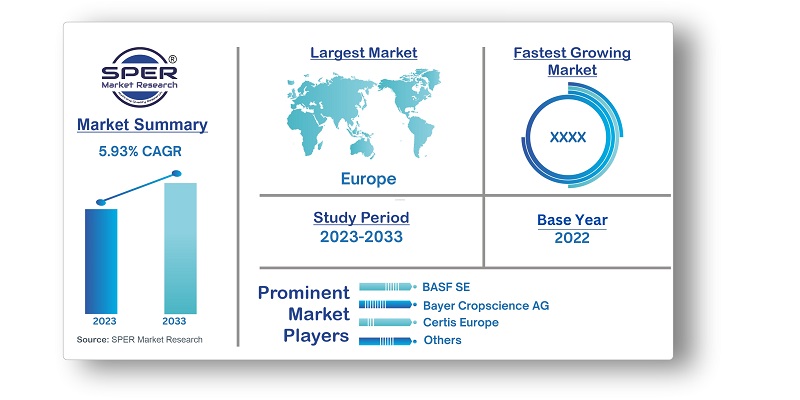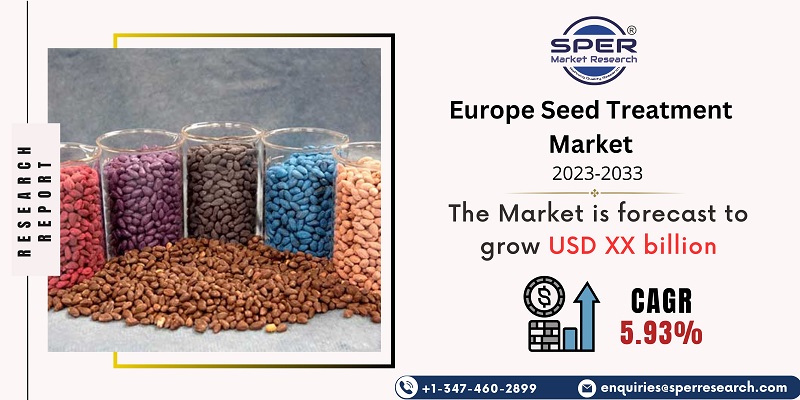
Europe Seed Treatment Market Trends, Growth, Size, Revenue, Scope, Challenges and Future Share
Europe Seed Treatment Market Growth, Trends, Analysis, Size- By Type, By Application, By Crop- Regional Outlook, Competitive Strategies and Segment Forecast to 2033
| Published: Sep-2023 | Report ID: AGRI2337 | Pages: 1 - 152 | Formats*: |
| Category : Agriculture | |||
- In March 2022, Germains Seed Technology launched Spinach Goseed, a revolutionary seed treatment, to the European market. It's a nutrient-rich coating technique mixed with bio-stimulants designed specifically for spinach to help it cope with abiotic stress.
- In January 2022, the UK government issued an emergency permit to use neonicotinoid-containing chemicals for sugar beet seed treatment in England.


| Report Metric | Details |
| Market size available for years | 2019-2033 |
| Base year considered | 2022 |
| Forecast period | 2023-2033 |
| Segments covered | By Type, By Application, By Crop |
| Regions covered | France, Germany, Italy, Netherlands, Spain, United Kingdom, Rest of Europe |
| Companies Covered | BASF SE, Bayer Cropscience AG, Certis Europe, Philagro France, Syngenta, Others |
- Farmers and Growers
- Seed Manufacturers
- Agricultural Input Suppliers
- Agrochemical Manufacturers
- Government Agencies and Regulators
- Research and Development Institutions
| By Type: | |
| By Application: | |
| By Crop: |
- Europe Seed Treatment Market Size (FY’2023-FY’2033)
- Overview of Europe Seed Treatment Market
- Segmentation of Europe Seed Treatment Market By Type (Chemical, Non-Chemical)
- Segmentation of Europe Seed Treatment Market By Application (Fungicide, Insecticide, Bio-Control, Others)
- Segmentation of Europe Seed Treatment Market By Crop (Cereals, Oilseeds, Others)
- Statistical Snap of Europe Seed Treatment Market
- Expansion Analysis of Europe Seed Treatment Market
- Problems and Obstacles in Europe Seed Treatment Market
- Competitive Landscape in the Europe Seed Treatment Market
- Impact of COVID-19 and Demonetization on Europe Seed Treatment Market
- Details on Current Investment in Europe Seed Treatment Market
- Competitive Analysis of Europe Seed Treatment Market
- Prominent Players in the Europe Seed Treatment Market
- SWOT Analysis of Europe Seed Treatment Market
- Europe Seed Treatment Market Future Outlook and Projections (FY’2023-FY’2033)
- Recommendations from Analyst
1.1. Scope of the report1.2. Market segment analysis
2.1. Research data source2.1.1. Secondary Data2.1.2. Primary Data2.1.3. SPER’s internal database2.1.4. Premium insight from KOL’s2.2. Market size estimation2.2.1. Top-down and Bottom-up approach2.3. Data triangulation
4.1. Driver, Restraint, Opportunity and Challenges analysis4.1.1. Drivers4.1.2. Restraints4.1.3. Opportunities4.1.4. Challenges4.2. COVID-19 Impacts of the Europe Seed Treatment Market
5.1. SWOT Analysis5.1.1. Strengths5.1.2. Weaknesses5.1.3. Opportunities5.1.4. Threats5.2. PESTEL Analysis5.2.1. Political Landscape5.2.2. Economic Landscape5.2.3. Social Landscape5.2.4. Technological Landscape5.2.5. Environmental Landscape5.2.6. Legal Landscape5.3. PORTER’s Five Forces5.3.1. Bargaining power of suppliers5.3.2. Bargaining power of buyers5.3.3. Threat of Substitute5.3.4. Threat of new entrant5.3.5. Competitive rivalry5.4. Heat Map Analysis
6.1. Europe Seed Treatment Market Manufacturing Base Distribution, Sales Area, Product Type6.2. Mergers & Acquisitions, Partnerships, Product Launch, and Collaboration in Europe Seed Treatment Market
7.1. Europe Seed Treatment Market Value Share and Forecast, By Type, 2023-20337.2. Chemical7.3. Non-Chemical
8.1. Europe Seed Treatment Market Value Share and Forecast, By Application, 2023-20338.2. Fungicide8.3. Insecticide8.4. Bio-Control8.5. Others
9.1. Europe Seed Treatment Market Value Share and Forecast, By Crop, 2023-20339.2. Cereals9.3. Oilseeds9.4. Others
10.1. Europe Seed Treatment Market Size and Market Share
11.1. Europe Seed Treatment Market Size and Market Share By Type (2019-2026)11.2. Europe Seed Treatment Market Size and Market Share By Type (2027-2033)
12.1. Europe Seed Treatment Market Size and Market Share By Application (2019-2026)12.2. Europe Seed Treatment Market Size and Market Share By Application (2027-2033)
13.1. Europe Seed Treatment Market Size and Market Share By Crop (2019-2026)13.2. Europe Seed Treatment Market Size and Market Share By Crop (2027-2033)
14.1. Europe Seed Treatment Market Size and Market Share By Region (2019-2026)14.2. Europe Seed Treatment Market Size and Market Share By Region (2027-2033)14.3. France14.4. Germany14.5. Italy14.6. Netherlands14.7. Spain14.8. United Kingdom14.9. Rest of Europe
15.1. BASF SE15.1.1. Company details15.1.2. Financial outlook15.1.3. Product summary15.1.4. Recent developments15.2. Bayer CropScience AG15.2.1. Company details15.2.2. Financial outlook15.2.3. Product summary15.2.4. Recent developments15.3. Certis Europe15.3.1. Company details15.3.2. Financial outlook15.3.3. Product summary15.3.4. Recent developments15.4. Philagro France15.4.1. Company details15.4.2. Financial outlook15.4.3. Product summary15.4.4. Recent developments15.5. Syngenta15.5.1. Company details15.5.2. Financial outlook15.5.3. Product summary15.5.4. Recent developments15.6. Others
SPER Market Research’s methodology uses great emphasis on primary research to ensure that the market intelligence insights are up to date, reliable and accurate. Primary interviews are done with players involved in each phase of a supply chain to analyze the market forecasting. The secondary research method is used to help you fully understand how the future markets and the spending patterns look likes.
The report is based on in-depth qualitative and quantitative analysis of the Product Market. The quantitative analysis involves the application of various projection and sampling techniques. The qualitative analysis involves primary interviews, surveys, and vendor briefings. The data gathered as a result of these processes are validated through experts opinion. Our research methodology entails an ideal mixture of primary and secondary initiatives.



Frequently Asked Questions About This Report
PLACE AN ORDER
Year End Discount
Sample Report
Pre-Purchase Inquiry
NEED CUSTOMIZATION?
Request CustomizationCALL OR EMAIL US
100% Secure Payment






Related Reports
Our Global Clients
Our data-driven insights have influenced the strategy of 200+ reputed companies across the globe.




















